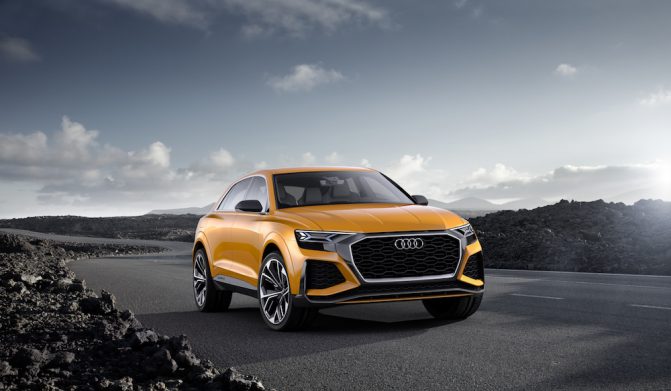By 2019 Audi plans to increase its Q range of SUVs by introducing two new concepts, the Audi Q8 and Q4. They also plan to launch battery-electric E-tron models to compete in the electric market. Additionally, Audi plans to launch three new electric models by 2020. The brand wants to gradually electrify models in each of its core series.
However, this year is all about the new generations of the Audi A8 and A7. Audi will unveil the A8 in Barcelona on July 11, when the first Audi Summit is held. This is a new event concept for the Ingolstadt-based company. They will create an exclusive presentation format centring around the Four Rings.
“We will show the world everything that defines Vorsprung durch Technik and our brand,” – Rupert Stadler, Chairman of the Board of Management of AUDI AG
Audi’s Electric Market Dreams
The focus for the future is the electric market and Audi clearly sees it as its way forward. In April, Audi agreed on a new development cooperation with Porsche for future vehicle architectures. Part of the cooperation is the development of shared premium architecture for electrification. This will be an especially effective lever to enhance the competitiveness of electric cars.
By 2025, Audi wants one third of its unit sales to be fully or partially electric models. This is quite something to try to manage in only eight years. Currently, in the UK, electric cars only represent 3.5% of the entire car market. Audi’s total UK market share at the end of 2016 was 6.6%. However, Audi has the opportunity to become a serious player in the electric market worldwide. It will launch the E-tron Quattro next year, a luxurious SUV, which should fill a gap in the electric market.
Digital and Mobility
While the electric market is a headliner, other future plans from the premium car manufacturer include an expansion of its digital services. With myAudi, the company aims to create a consistent entry into the brand’s digital world. It will establish a platform for a wide range of online services, which will be open for third-party providers to offer services. Audi is also expanding its mobility services for urban areas and intends to offer them in more than 15 markets worldwide by the end of this decade.
Audi founded a subsidiary in the Volkswagen Group in March 2017. It will now take over the leading role within the Volkswagen Group in the development of autonomous driving. Autonomous Intelligent Driving GmbH’s technology for driverless vehicles in urban environments is being worked on and will be applicable in models of various brands. Consequently, within the next decade, the company hope it will be ready for initial use in a small series of vehicles.
Audi Group Finances
Operating profits were down in 2016, which Audi put down to issues in connection with the diesel crisis and Takata airbags. However, in the first quarter of 2017, the Audi Group achieved an operating profit of more than €1.2 billion. With an operating return on sales of 8.7 percent, the company clearly met its profitability target. The net cash flow increased to more than €1.5 billion.




